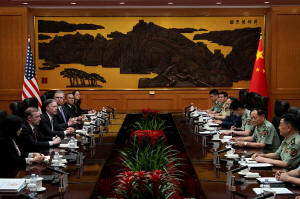Sullivan meets Xi as wide-ranging China-US talks near end in Beijing
 Send a link to a friend
Send a link to a friend
 [August 29, 2024]
By Trevor Hunnicutt [August 29, 2024]
By Trevor Hunnicutt
BEIJING (Reuters) -U.S. National Security Adviser Jake Sullivan met
Chinese President Xi Jinping in Beijing on Thursday, wrapping up three
days of wide-ranging talks aimed at easing tensions between the two
world powers ahead of November's U.S. election.
As the pair sat down in the Great Hall of the People, Xi told Sullivan
Beijing was committed to a stable relationship with Washington.
"In this changing and turbulent world, countries need solidarity and
coordination ... not exclusion or regress," Xi said.
Sullivan told Xi U.S. President Joe Biden was committed to managing the
relationship to avoid conflict and "looks forward to engaging with you
in coming weeks".
The White House said after the meeting that the two sides were planning
for a call between Xi and Biden in the weeks ahead.
This week's discussions covered a range of issues complicating ties
between the countries. Sullivan's in-tray included tensions over Taiwan,
the South China Sea and Russia, and U.S. demands for more Chinese help
to stem the flow of the ingredients for fentanyl, the leading cause of
drug overdoses in the United States.

Despite sometimes lengthy sessions, considerable gaps remain on some
issues, such as China's actions against the Philippines over disputed
shoals in the South China Sea, one senior U.S. official said.
Saying it was an issue likely to be only managed rather than solved, the
official said he expected it to be on the agenda for "the foreseeable
future". "If it's not this shoal, it's going to be another feature," the
official said.
Before meeting Xi, Sullivan had a rare meeting with a general considered
by diplomats to be the president's key military adviser, Zhang Youxia,
vice chairman of the Central Military Commission. He also had extensive
discussions with China's top diplomat, Wang Yi, on Tuesday and
Wednesday.
With Zhang, Sullivan pushed for enhanced working-level communications
between the countries' militaries during what was the first meeting
between Zhang and a Biden administration official.
Sullivan said that both countries had a responsibility to prevent
competition from veering into conflict or confrontation.
"Given the state of the world and the need for us to responsibly manage
U.S.-China relations, I think it's a very important meeting," he said.
[to top of second column]
|

Zhang Youxia, Vice Chairman of the CPC Central Military Commission,
attends a meeting with White House national security adviser Jake
Sullivan at the Bayi building in Beijing, Thursday, Aug. 29, 2024.
Ng Han Guan/Pool via REUTERS

Both referred to progress in military communications and
arrangements for theatre-level commanders to speak soon by
telephone, which the United States has pushed for amid increased
regional deployments.
The White House said Sullivan also emphasised the need for stability
across the Taiwan Strait and freedom of navigation in the disputed
South China Sea, a vital trade waterway, and raised concerns about
China's support for Russia's defence industrial base.
Zhang is believed to be close to Xi and has survived turmoil in
China's military ranks. Western and Asian diplomats say he is more
powerful than the defence minister, who more frequently meets
foreign officials.
'CONSTRUCTIVE DISCUSSIONS'
In Wednesday's meeting, Wang and Sullivan discussed the prospect of
fresh talks soon between Biden and Xi and shared contrasting
perspectives on the conflicts in the Middle East and Ukraine,
Chinese territorial claims from Taiwan to the South China Sea, and
trade.
"The key to the smooth development of China-U.S. interaction lies in
treating each other as equals," Wang told Sullivan, according to
state broadcaster CCTV.
The White House said the two held "candid, substantive, and
constructive discussions".
In the final months of his presidency ahead of the Nov. 5 election,
Biden has pushed direct diplomacy to influence Xi and keep tensions
at bay. U.S. Vice President Kamala Harris, the Democratic candidate,
would probably pursue a similar strategy.
However, many analysts aligned with former President and current
Republican candidate Donald Trump see that approach as too soft in
the face of China's increasingly assertive foreign policy.
(Reporting by Trevor Hunnicutt and Beijing newsroom;Writing by Greg
Torode; Editing by Lincoln Feast, Clarence Fernandez and Helen
Popper)
[© 2024 Thomson Reuters. All rights
reserved.]This material
may not be published, broadcast, rewritten or redistributed.
Thompson Reuters is solely responsible for this content.
 |